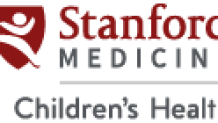

The following content is created in partnership with Stanford Medicine Children's Health. It does not reflect the work or opinions of the NBC Bay Area editorial staff. Click here to learn more about Stanford Medicine Children's Health
From the growing conversation around mental health, to a pandemic that exposed healthcare disparities among our neighbors, there’s a new frontier in healthcare for the most pioneering of providers. They take note of shifting tides and recognize the need for community involvement, because healthcare is so much more than what happens in the doctor’s office. Chief among them is Stanford Medicine Children’s Health which has been supporting the Bay Area for over three decades in innovative ways. Once exclusively known for its pediatric and obstetrics practices, Stanford Medicine Children's Health has since evolved to garner a name for their uplifting community support beyond their hospital walls. “Our hospital is really founded on that principle of being community-minded,” says Melissa Burke, Director of Community Relations.
Bridging the healthcare gap by targeting underserved youth
1-in-24 students that live in San Francisco are homeless, many more remain uninsured or underinsured. Stanford Medicine Children’s Health understands the plight of the uninsured, not only for individuals, but for the community as whole. When people have difficulty accessing healthcare, they are likely to forego preventative care, resulting in untreated illnesses, worsened health outcomes, and future financial strain.
After decades of local on-the-ground work, Stanford Medicine Children’s Health has been able to leverage their community involvement by investing in community health centers and deploying their mobile health clinic, the Teen Van, in the underserved areas where it is needed the most. Their local engagement enabled them to be particularly adept during the pandemic. “Thanks to our deep ties to the community, we knew where to mobilize [the Teen Van] quickly to be able to get those services out,” said Burke. To address health disparity in the community, The Teen Van routinely visits high schools, community colleges, and non-profit organizations throughout the Bay Area, offering physical exams, immunizations, medications, and even mental health support.
Joey Vaughan, Manager of Community Benefits and Partners, understands that mental wellness is a critical facet of overall health and that social determinants of health like income, education, and housing, cannot be overlooked:
“For a very long time, hospitals primarily saw themselves working in the space of mostly physical health. Then folks started to understand that mental health should be included in that. Now, hospitals have begun to understand this concept of the social determinants of health, that there are things that really can be categorized as social health. That affects, oftentimes, a lot more than physical health–evidenced by the fact that your ZIP code is more determinative of how your health goes than your genetic code."
Addressing food insecurity
Food insecurity is the lack of consistent access to enough food for an active, healthy life. And because proper nutrition is crucial to many facets of wellness, from mental health to physiological wellbeing and beyond, the impact of food insecurity on public health is significant. For families who face extra obstacles sourcing healthy food, the impact extends beyond the physical. In addition to the mental toll of experiencing food insecurity, families are often compelled to prioritize the convenience of unwholesome cheap meals or fast food in favor of nutrition, which can contribute to diet-related health problems like obesity, diabetes, and heart disease. The wealth disparities that create food insecurity effectively create health disparities, perpetuating a cycle of poor health and limited opportunities for these populations.
Get a weekly recap of the latest San Francisco Bay Area housing news. Sign up for NBC Bay Area’s Housing Deconstructed newsletter.
In an effort to address food insecurity and its effects, Stanford Medicine Children’s Health partners with Second Harvest of Silicon Valley and other local organizations who support the hundreds of thousands of food insecure Bay Area residents. Driven by a motivation to improve public health outcomes, many employees at Stanford Medicine Children’s Health extend their work beyond the office and into the field. “I personally volunteered at the Second Harvest to help distribute food,” says Leona Wong, Director of Brand Strategy. “We're trying to [involve more of] our employees, that’s also what makes us unique and makes us feel part of the community.”
Housing assistance and beyond
It’s easy to comprehend how housing and public health outcomes are deeply intertwined. “If you don't have a roof over your head, how are you going to be healthy in all these other ways?”, remarked Vaughan. “So that's a space we've started to invest in and plan on continuing to invest in,” Vaughan continued. “We intend to lift up the community so that they have a conduit to our hospital, even though they may never step foot in our hospital doors.”
Stanford Medicine Children’s Health continues their outreach work for the betterment of the community. Discover how Stanford Medicine Children’s Health helps improve the quality of life for all in the Bay Area by extending healthcare access and support programs to underserved communities. Click here to learn more.

